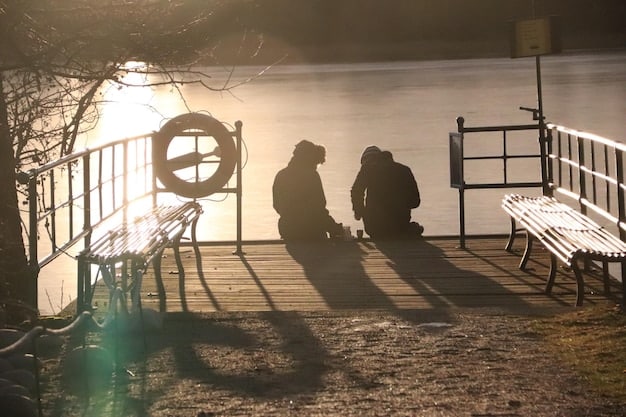Friendship Breakups: 3 Steps to Heal and Move On

Friendship breakups can be just as painful as romantic ones; however, understanding why they occur and implementing healthy coping mechanisms, such as acknowledging your feelings, setting boundaries, and focusing on self-care, can help you heal and move forward.
Losing a friend can feel like losing a part of yourself. While we often focus on romantic relationships, the end of a friendship can be just as devastating. If you’re going through a friendship breakup: 3 steps to move on and heal, know that you’re not alone and healing is possible.
Understanding Friendship Breakups
Friendship breakups are a painful reality that many people experience. Unlike romantic relationships, which often have clear markers of commitment and closure, friendships can fade or end abruptly, leaving you confused and hurt. Understanding the dynamics of these breakups is the first step towards healing.
Why Friendships End
Friendships, like all relationships, are subject to change and challenges. Several factors can contribute to their dissolution. Identifying these reasons can provide clarity and help you avoid similar situations in the future.
Common Causes of Friendship Breakups
- Drifting Apart: As people grow and evolve, their interests, values, and priorities may diverge, leading them to drift apart naturally.
- Changes in Life Circumstances: Major life events such as marriage, parenthood, or career changes can alter social dynamics and reduce the time and energy available for friendships.
- Unresolved Conflicts: Misunderstandings, disagreements, or betrayals that are not addressed can create distance and resentment, ultimately leading to a breakup.
- Toxic Behaviors: Patterns of negativity, manipulation, or constant drama can strain even the strongest friendships, causing one or both parties to seek separation.
Recognizing these common causes can help you understand the factors that contribute to friendship breakups and address them more effectively in future relationships.
Navigating the complexities of friendships equips us with valuable insights to foster enduring connections and prioritize our well-being.
Step 1: Acknowledge Your Feelings
The first step towards healing from a friendship breakup is to acknowledge and validate your feelings. It’s okay to feel sad, angry, confused, or even a combination of emotions. Suppressing these feelings can prolong the healing process. Give yourself permission to grieve the loss of the friendship.

Allow Yourself to Grieve
Grieving the end of a friendship is a natural and necessary part of the healing process. It involves recognizing the significance of the relationship and the impact of its loss on your life.
Healthy Ways to Grieve
- Journaling: Writing down your thoughts and feelings can help you process emotions and gain clarity.
- Talking to Someone: Sharing your experiences with a trusted friend, family member, or therapist can provide support and perspective.
- Engaging in Self-Care: Taking care of your physical and emotional needs can help you cope with the stress and sadness associated with the breakup.
Allowing yourself to grieve is a crucial step toward emotional healing and moving forward.
Recognizing your emotions and permitting yourself the necessary mourning period will allow acceptance and healing.
Step 2: Set Boundaries and Limit Contact
Setting boundaries and limiting contact with your former friend is essential for creating space and promoting healing. Continued interaction can prolong the pain and make it difficult to move on. Establishing clear boundaries provides a sense of control and protects your emotional well-being.
Why Boundaries Are Important
Boundaries define what you are and are not willing to accept in your relationships. They protect your emotional, mental, and physical well-being by creating clear expectations and limits.
Strategies for Setting Boundaries
- Limit Social Media Contact: Unfollow or mute your former friend on social media to reduce exposure to their activities and posts.
- Avoid Mutual Friends: Minimize interactions with mutual friends who might inadvertently share information about your former friend.
- Communicate Your Needs: If necessary, communicate your need for space and limited contact directly to your former friend.
Setting boundaries helps you create the emotional distance necessary to heal and move on from the friendship breakup.
Establishing these boundaries, even if uncomfortable, is a testament to your commitment to your emotional and mental recuperation.
Step 3: Focus on Self-Care and New Connections
The final step in healing from a friendship breakup is to focus on self-care and nurturing new connections. Engaging in activities that bring you joy and spending time with supportive people can help you rebuild your sense of self and create a positive future.

Prioritize Self-Care
Self-care involves taking deliberate actions to protect your physical, mental, and emotional health.
Effective Self-Care Practices
- Engage in Hobbies: Pursue activities that you enjoy and that bring you a sense of fulfillment.
- Practice Mindfulness: Focus on the present moment and cultivate a sense of calm through meditation or deep breathing exercises.
- Exercise Regularly: Physical activity can boost your mood and reduce stress.
- Maintain a Healthy Diet: Nourishing your body with wholesome foods can improve your overall well-being.
Nurture New Connections
Building new friendships and strengthening existing ones can provide support and perspective during the healing process. Seek out opportunities to connect with people who share your interests and values.
Remember, invest in relationships where reciprocated support is clear to foster meaningful and lasting relations that will carry you through the good and the bad.
Rebuilding After a Friendship Breakup
After taking the initial steps to heal from a friendship breakup, the next phase involves actively rebuilding your life and fostering new connections. This process requires self-reflection, openness to new experiences, and a proactive approach to creating a fulfilling social life.
Evaluate Your Needs
Assessing your current emotional and social needs is crucial. Reflect on what you seek in friendships and the qualities you value in others. This self-awareness will guide you in forming healthier, more aligned relationships.
Tips for Rebuilding
- Join Clubs or Groups: Participating in activities that align with your interests is a great way to meet like-minded individuals.
- Volunteer: Volunteering offers a chance to give back to your community while connecting with others who share your values.
- Reconnect with Old Friends: Reach out to old acquaintances or friends you may have lost touch with.
- Be Open to New Experiences: Step outside your comfort zone and embrace opportunities to meet new people and try new things.
Building a strong support system is vital for long-term well-being. Cultivate relationships that are built on mutual respect, trust, and genuine connection.
In your journey forward, remember that rebuilding brings with it the chance to shape not only how you relate to others but also deepen your self-understanding and enhance the joy in your daily experiences.
Learning and Growing from the Experience
Friendship breakups, while painful, offer valuable opportunities for learning and personal growth. By reflecting on what happened and identifying the lessons learned, you can emerge stronger and more resilient.
What to Reflect On
- What was your role in the friendship dynamic? Considering your own contributions to the friendship, both positive and negative, can provide valuable insights.
- Is there anything you would do differently? Identifying areas where you could have communicated better or handled situations more effectively can improve future relationships.
- What did you learn about yourself? Understanding how the breakup affected you emotionally and mentally can help you develop coping mechanisms and self-awareness.
Reflecting on these key questions allows you to gain a deeper understanding of yourself and your relationships.
The key is to learn from these valuable life lessons in order to be resilient throughout all aspects of life, and build stronger future relationships.
| Key Point | Brief Description |
|---|---|
| 💔 Acknowledge Feelings | Allow yourself to grieve and feel emotions without judgment. |
| 🛑 Set Boundaries | Limit contact to create space for healing. Avoid constant reminders. |
| 🌱 Self-Care | Focus on activities that bring you joy and promote well-being. |
| 🫂 New Connections | Nurture existing friendships and be open to forming new ones. |
Frequently Asked Questions
▼
Yes, it’s completely normal. Friendships can be deeply meaningful, and their loss can trigger grief similar to that experienced after a romantic breakup or the death of a loved one. Acknowledge your feelings and allow yourself time to heal.
▼
The timeline for healing varies from person to person. The depth of the friendship, individual coping mechanisms, and external support systems all play a role. Be patient with yourself and focus on consistent self-care.
▼
Consider the reasons for the breakup. If it was due to a misunderstanding or temporary conflict, reconciliation might be possible. However, if the issues are deep-seated or involve toxic behaviors, it may be best to move on.
▼
Focus on open and honest communication, setting healthy boundaries, and choosing friends whose values align with yours. Nurture your friendships through consistent effort and mutual respect. Learn from past experiences and adapt as needed.
▼
It’s normal to have lingering thoughts. Try to redirect your focus to activities you enjoy or spend time with supportive friends and family. Journaling or talking to a therapist can also help process these thoughts and feelings.
Conclusion
Friendship breakups can be incredibly challenging, but by acknowledging your feelings, setting boundaries, and focusing on self-care and new connections, you can heal and move forward. Remember that it’s okay to grieve the loss, and with time and effort, you can rebuild your life and create fulfilling new friendships.





